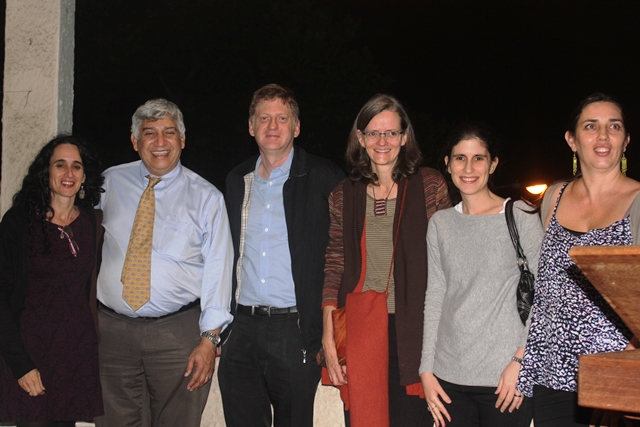The Urban Futures Centre at DUT (UFC@DUT), the University of KwaZulu-Natal (UKZN) and Wits University (Wits) hosted a two book launches at Ike’s Books and Collectables this week (Tuesday, 07 April 2015).
The launch was also attended by DUT Vice-Chancellor of DUT, Professor Ahmed Bawa, who spoke about his hopes for regular book launch programmes at the University to get more students involved in reading.
Guest speaker, UKZN’s Professor Emeritus of Development Studies, Bill Freund, after having read both books gave his personal reviews. While he found both books to be completely different from each other, he observed them to be important books for South African planners and said all planners should own a copy of each (book).
The books: Changing Space, Changing City Johannesburg after Apartheid edited by Philip Harrison, Graeme Gotz, Alison Todes and Chris Wray and Urban Governance in Post-Apartheid Cities Modes of Engagement in South Africa’s Metropoles edited by Christoph Haferburg and Marie Huchzermeyer were published by Wits University Press and the University of KwaZulu-Natal Press respectively.
Reviewing Changing Space, Changing City Johannesburg after Apartheid first, Freund said, “This book is attributed to the planning of Johannesburg and it really is a wonderful study of spatiality. The first part of the book is about structure. Johannesburg has a complicated topography and it seems like the planners were obsessed with the idea of densification and de-densification… The second part of the book talks about the different bits and pieces of the seven district neighbourhoods. There is an immense range, a massive study of what goes on in an area.”
Freund found Urban Governance in Post-Apartheid Cities Modes of Engagement in South Africa’s Metropoles to be at an advantage of being up to date but “not very romantic”. “There is an illusion that you can remake cities, that you can undo apartheid which is not true. It is not possible. The book illustrates a gap to be studied between politicians and democracy where you find the dominance of one political party which is not really challenged politically besides in the Western Cape. They fail to sympathise with the people’s needs of providing electricity, water and housing. Rather, they are more interested in their comrades and being popular,” he said.
The book, Changing Space, Changing City Johannesburg after Apartheid has three sections. Section A provides an overview of macro spatial trends and the policies that have influenced them. Section B explores the shaping of the city at district and suburban level, revealing the peculiarity of processes in different areas. This analysis elucidates the larger trends, while identifying shifts that are not easily detected at the macro level. Section C is an assembly of chapters and short vignettes that focus on the interweaving of place and identity at a micro level.
The contributors of Urban Governance in Post-Apartheid Cities Modes of Engagement in South Africa’s Metropoles cover urban governance in contemporary South Africa across three spheres, the state, the community and the private sector through a variety of lenses. Spatial concerns are central to many of the analyses and case studies in which the authors highlight different modes that influence the steering of South Africa’s largest cities. This is the most important work yet on cities in post-apartheid South Africa. Its chapters produce detailed accounts of the alliances and conflicts which are generated daily in our cities and are essential reading for an understanding of urban South Africa today.
– Thobele Nzama
Pictured from left: Prof Monique Marks, UFC@DUT; Prof Ahmed Bawa, DUT; Professor Philip Harrison; Prof Marie Huchzermeyer; Dr Orli Bass and Dr Kira Erwin, UFC@DUT.

